« May 2008 | HOME PAGE | July 2008 »
June 25, 2008
The Other Ethnic Tension
Not much time to write, as I'm off to the U.S. tomorrow for a visa run. I'm keeping my fingers crossed that I'll finally be getting a working (Z) visa after three years of scrounging around for business (F) visas. I might have been able to get the new visa in Hong Kong rather than heading halfway across the world, but nobody can say for sure in these pre-Olympic times... and it'll be good to be home for the 4th of July. I'm looking forward to my first (and second and third, etc.) non-Uyghur summer barbecue since 2004.
I want to point out an interesting article in the LA Times about ethnic tensions out west — particularly in Qinghai — between Tibetan and Hui (Chinese Muslim) residents:
"Waitress, there's a tooth in my soup," a Tibetan woman said indignantly.
Before long, a curious crowd of Tibetans gathered around the soup bowl. Restaurant owner Yun Sha came out of the kitchen and insisted that the offending item was just a chip off a lamb bone. "Let's trash this restaurant," Yun heard somebody scream, and the crowd proceeded to do just that.
Tables, chairs, a television flew through the air. Kitchen equipment was smashed with bricks. Soon the crowd had moved on to other Muslim restaurants on the same strip as terrified waiters and cooks scurried outside for safety.
Disputes such as that one last summer are common in western China, where a volatile ethnic stew is increasingly erupting into violence. Among China's dozens of minorities, few get along as badly as Tibetans and Muslims.
I spent the month of January earlier this year volunteering in a Tibetan village in Qinghai, and the subject of Huis came up a number of times. Tibetans not only resent Huis for running most of the shops and restaurants in their small villages, but have a laundry list of complaints going back decades (at least).
According to Tibetans I spoke with in Qinghai, not only do Huis run the government and get all the subsidies meant for minorities, but they also act as watchdogs for the Han majority. During the Cultural Revolution, the Hui were especially enthusiastic about destroying Tibetan monasteries. And during periods of weak central government control in Qinghai during the first half of last century (and further back), Hui warlords sought to kill as many Tibetans as possible, resettling their lands with Hui immigrants.
I'm not saying all of that's true, because I don't really know for sure. But that's what people think.
During my stay in Qinghai, I had the interesting experience of watching the film Kekexili: Mountain Patrol with a group of Tibetan villagers who were also watching for the first time. There's a scene early in the movie where the Tibetans — who are trying to protect endangered antelopes — interrogate a group of Hui (and Han) poachers at gunpoint. The Tibetans I was with thought that was the best part of the movie... bad-ass Tibetans acting tough and beating the crap out of some Huis. And it turns out the Hui poachers in the film were from Hualong County, which is where I just happened to be volunteering.
Fantastic movie, by the way. Check out the clip above for a little Zang-Hui ethnic tension, and read the full article below.
Tensions rise between Tibetans, Chinese Muslims
Long-standing enmity is a factor in recent clashes in Lhasa and other areas.
By Barbara Demick, Los Angeles Times Staff Writer
June 23, 2008
GUOJIA, CHINA -- The riot began with a customer's complaint about her dinner.
"Waitress, there's a tooth in my soup," a Tibetan woman said indignantly.
Before long, a curious crowd of Tibetans gathered around the soup bowl. Restaurant owner Yun Sha came out of the kitchen and insisted that the offending item was just a chip off a lamb bone. "Let's trash this restaurant," Yun heard somebody scream, and the crowd proceeded to do just that.
Tables, chairs, a television flew through the air. Kitchen equipment was smashed with bricks. Soon the crowd had moved on to other Muslim restaurants on the same strip as terrified waiters and cooks scurried outside for safety.
Disputes such as that one last summer are common in western China, where a volatile ethnic stew is increasingly erupting into violence. Among China's dozens of minorities, few get along as badly as Tibetans and Muslims. Animosities have played a major -- and largely unreported -- role in the clashes that have taken place since mid-March. During the March 14 riots in the Tibetan region's capital, Lhasa, many of the shops and restaurants attacked were Muslim-owned. A mob tried to storm the city's main mosque and succeeded in setting fire to the front gate. Shops and restaurants in the Muslim quarter were destroyed.
Over the last five years, there have been dozens of clashes between Tibetans and Muslims in Sichuan, Gansu and Qinghai provinces, as well as in the Tibet Autonomous Region. Most of the incidents go unreported. The state-controlled news media are not eager to publicize anything that belies Communist Party claims that minorities live together in a "harmonious society."
Andrew M. Fischer, a London-based Tibet scholar who is one of the few who has written on the subject, said the Tibetan exile community also was reluctant to publicize incidents that might harm the international image of Tibetans.
"It is the dark side of Tibetan nationalism," Fischer said. "It is almost as though the Tibetans are diverting their anger over their own situation towards another vulnerable minority."
Most of the incidents involve the Hui, who ethnically are Han Chinese but practice Islam. China's 9.8 million Hui and 5.4 million Tibetans historically have lived in proximity, at various times fighting, competing or intermarrying and collaborating.
As Buddhists, the Tibetans don't like to kill animals, but they do eat meat and wear furs, so they leave it to Muslim butchers and tanners to do the slaughtering. The Muslims also own many restaurants, and they don't shy away from remote Tibetan areas where other Han Chinese are loath to tread. They often buy products from Tibetan nomads, who have difficulty selling because of their illiteracy.
"To be honest, the Tibetans don't have the business savvy of the Hui. The Tibetans have to sell their products to Hui. The Hui have to buy from the Tibetans," said Genga Jatsi, a Tibetan doctor from Qinghai. "I suppose because we are interdependent we resent each other."
The tensions are palpable in Golog, a mountainous prefecture in Qinghai. Along a four-lane boulevard called Tuanjie, or "Solidarity," Street, a large archway separates the Tibetan town of Dawu from the smaller Muslim town of Guojia.
Muslim taxi drivers are nervous about crossing into the Tibetan side at night. And since last summer's restaurant incident, Tibetans have refused to go to the strip of Muslim eateries specializing in lamb and noodles.
"We're afraid that there will be more trouble," said Yun, who sold his restaurant after the incident but still lives in Golog, doing construction work. He sat in an otherwise empty restaurant around the corner from his old place, he and the restaurant owner, Ma Zhongyang, slumped over the linoleum tables, watching a small television in the corner.
The men said about 800 of Guojia's 3,000 Muslims had left in recent months, frightened by what had happened in Lhasa. During the mid-March riots, Muslim shopkeepers and their families were badly hurt and some were killed when fires set in their shops spread to upstairs apartments.
"We saw what happened on television. After that, I sent away my children from here. I fear for their safety," Ma said.
Many Muslims have stopped wearing the traditional white caps that identify their religion. Many women now wear a hairnet instead of a scarf. Since the nearest mosque was burned down in August, the Muslims pray at home -- "in secret," Ma said.
Twenty Tibetans, many of them monks, were arrested in the incident and a senior monk, accused of being the ringleader, was sentenced to death, Fischer said.
The animosity dates to at least the 1930s, when Muslim warlord Ma Bufeng tried to establish an Islamic enclave in Qinghai. Tibetans were pushed off their lands, some executed or forced to convert. After the communists took over in 1949, tensions were repressed.
Tsering Shayka, a Tibetan historian, said ethnic conflicts had resurfaced in recent years with the gradual liberalization of China, in particular the relaxation of travel restrictions.
"What is happening now is that you have all this transient population. People are migrating here and there and coming into more and more day-to-day contact. In the past, they weren't allowed to trespass into each other's territory and you had no ethnic conflict," Shayka said.
Tibetans complain frequently about their culture being diluted when non-Tibetans, in particular Muslims, move into their areas and buy Tibetan businesses. That has been especially true in Lhasa, where Muslims now own many of the souvenir shops.
In the mid-1990s, Tibetans started boycotting Muslim restaurants in Lhasa after it was claimed that somebody had found a finger in a bowl of soup, setting off a rumor that Muslims were cannibals. Another rumor had it that Muslim cooks were urinating on food or adding their bathwater to soup, which, it was said, would function as a charm to make Tibetans convert to Islam.
"You hear all these stories about Muslims putting stuff in the soup. But I think it is all about business competition and economics," said Tsering, 37, a Tibetan businessman from Lhasa who did not want his last name to be published.
Making matters worse, the Hui usually support the Chinese government in its repression of Tibetan separatism.
"They think the Dalai Lama is their leader. But how is independence possible?" whispers Han Rugubai, a 26-year-old Muslim who sells clothing at Dawu's main market. "With the country developing so fast, life is good. People have enough to eat. They have clothes."
Han said she believed that the Tibetans' real quarrel was with the Han Chinese who dominate this country's population and politics.
"They use us as a scapegoat for their grievances against the country," she said.
In the last few years, clashes have broken out over the most trivial grievances. In February, a Tibetan child's complaint about what a Hui merchant was charging for balloons triggered a brawl that involved thousands of people.
Chinese troops intervened in a 2003 dispute that started over a game of billiards. A Tibetan and a Muslim died in tit-for-tat killings, the Muslim stabbed to death with a barbecue skewer.
barbara.demick@latimes.com
Jia Han of The Times' Beijing Bureau contributed to this report.
posted June 25, 2008 at 11:34 PM unofficial Xinjiang time | Comments (135)
June 24, 2008
Setting Them Free. Maybe.
 This will undoubtedly not be the end of the long legal journey for Uyghurs being held without reason in Guantanamo Bay, but it's a step in the right direction. From the NY Times:
This will undoubtedly not be the end of the long legal journey for Uyghurs being held without reason in Guantanamo Bay, but it's a step in the right direction. From the NY Times:
After the first court review of the basis for holding a Guantánamo detainee, the federal appeals court in Washington has overturned the Pentagon’s decision and ordered that the man be released or given a new military hearing.
The ruling involved a detainee, Huzaifa Parhat, one of 17 Guantánamo detainees who are ethnic Uighurs, members of a Muslim minority in western China. The imprisonment of the Uighur detainees has drawn wide attention, largely because of their lawyers’ claim that they were never enemies of the United States and were mistakenly swept into Guantánamo.
So, congratulations Huzaifa, for stickin' it to George W. Bush. I hope you and your buddies are released soon into some sort of protection program in the US. Maybe we can get together for some kebabs and kosher hot dogs next 4th of July? Sike! Everyone knows my celebratory favorites are zongzi and tang yuan'r.
You can read the full article below. Maybe one of you can explain to me why the court hasn't released the full ruling, only a summary? What's up with that?
Court Overturns Guantánamo Hearing
The New York Times
By WILLIAM GLABERSON
Published: June 24, 2008
After the first court review of the basis for holding a Guantánamo detainee, the federal appeals court in Washington has overturned the Pentagon’s decision and ordered that the man be released or given a new military hearing.
The ruling involved a detainee, Huzaifa Parhat, one of 17 Guantánamo detainees who are ethnic Uighurs, members of a Muslim minority in western China. The imprisonment of the Uighur detainees has drawn wide attention, largely because of their lawyers’ claim that they were never enemies of the United States and were mistakenly swept into Guantánamo.
Detainees’ lawyers portrayed the ruling as the latest important court rebuke to the Bush administration over its detention policies. They suggested that the ruling concluded that the procedures used by the Pentagon in its hearings at Guantánamo were deeply flawed.
“This raises enormous questions about just who they are holding at Guantánamo,” said the lead lawyer for Mr. Parhat, P. Sabin Willett.
But the court did not immediately release the ruling from a unanimous three-judge panel of the United States Court of Appeals for the District of Columbia Circuit. In a terse one-paragraph summary, the court clerk stated simply that, “the court directed the government to release or to transfer Parhat, or to expeditiously hold a new tribunal consistent with the court’s opinion.”
The statement of the clerk, Mark J. Langer, said that the court’s opinion issued on Friday was under seal because it contained classified information. It added that a decision was being prepared for public release.
The ruling came in the first case to receive a full court review of the Pentagon hearings that determine whether a detainee is properly held as an enemy combatant. At those hearings detainees are not permitted to have lawyers, cannot see all of the evidence against them and face many hurdles in trying to present their own evidence.
The adequacy of the hearings was an issue in the Supreme Court’s decision on June 12 about Guantánamo that decided the related question of whether detainees have a constitutional right to challenge their detention in federal court.
The decision in Mr. Parhat’s case came in a challenge under the much more limited procedures Congress provided for contesting the findings of the military hearings, known as combatant status review tribunals. In a 2005 law, the Detainee Treatment Act, Congress limited those challenges, requiring detainees to show that the Pentagon had not followed it own procedures.
Detainees’ lawyers said Monday that successfully challenging a finding that a detainee was an enemy combatant under those limitations showed the extent of the difficulties with the hearing system.
Department of Justice spokesmen did not immediately comment on the ruling.
posted June 24, 2008 at 12:38 PM unofficial Xinjiang time | Comments (82)
June 17, 2008
Image of the Day

posted June 17, 2008 at 10:32 PM unofficial Xinjiang time | Comments (77)
June 15, 2008
Olympic Fever in Xinjiang

Two vaguely related news items today, both of which tie into the whole pre-Olympic security craziness we've been living through in China lately...
First, the Olympic torch is heading to Xinjiang on Wednesday... probably. Surprised? So is everybody else, because the festivities have suddenly been moved forward a week. The torch relay was kinda maybe sorta supposed to go through Tibet this week, but those plans are up in the air and very hush hush. (Translation: nobody know what the f#%! is going on.)
AFP has published a prequel follow-up on the whole "Uyghurs bomb a police station" story from last week. The first article indicated that the attack was in response to a heavy-handed police crackdown in Xinjiang. This article — again based on an interview with a spokesman for the World Uyghur Congress — fleshes out a few details:
China has tightened controls on Muslims in its remote west ahead of the Olympic torch's arrival next week to thwart any actions aimed at disrupting the relay, residents and exiles said.
The measures include detaining thousands in the Xinjiang region and forcing Muslim religious officials to undergo "political education" on "protecting" the Olympics, said Dilxat Raxit, spokesman for the Germany-based World Uighur Congress.
With the Beijing Olympic torch expected in Xinjiang on its nationwide tour, authorities have also confiscated the passports of some Muslims, Uighurs told AFP.
"They are afraid people might travel abroad and join some sort of plot against the Olympics," said a college-educated Uighur woman in her twenties, whose passport was taken by police here earlier this year.
The woman, whose name was withheld by AFP to protect her from police reprisals, was forced to cancel plans to attend graduate school overseas....
Beijing Olympic organisers recently said the sensitive Xinjiang torch leg would take place June 17-19, a week earlier than planned. It originally was to transit the capital Urumqi, Kashgar, and two other cities.
However, Olympic officials last week would not disclose up-to-date plans to AFP amid confusion surrounding sensitive relay legs following violent unrest in Tibet in March that laid bare simmering discontent in China's minority regions.
A stage was set up near Kashgar's main mosque, apparently for torch ceremonies, but residents said there had been no new announcement on when the flame would arrive.
China has blamed the confusion on schedule changes caused by the May 12 Sichuan earthquake.
Raxit said Muslims in Kashgar have also been ordered to avoid any contact with foreigners, report any overseas journalists operating in the area and sign pledges denouncing separatism and supporting Beijing.
Thousands of Muslims who were not residents of Kashgar and Urumqi also had been forced to leave those cities, he said.
I've even heard that some cities in Xinjiang are now issuing strange new local residence cards to foreigners, to sort out the good from the bad.
Of course, Xinjiang isn't alone in suffering from "the confusion" sweeping across China these days. Everywhere I go in Beijing, I hear foreigners complaining about visa troubles. I, too, am amongst those who will have to return to their home countries now that the Hong Kong visa run has become a nightmare.
••••
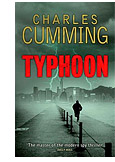 The second item is a review of Charles Cummings' new China thriller, Typhoon, with a plot particularly relevant to the news above:
The second item is a review of Charles Cummings' new China thriller, Typhoon, with a plot particularly relevant to the news above:
In Charles Cumming's well-timed and excellently executed Typhoon... the pantomime villain lurking in the background this time is the spectre of Islamic fundamentalism.
This might at first glance seem opportunistic and a mite improbable, but that only reflects one of the book's key themes: how little any of us know or apparently cares, especially since 9/11, about the rampant human rights abuses in China's other controverisally annexed province: Xinjiang....
Swoop on a decade to almost the present day and Joe goes back to China to find all his old nemeses waiting for him, coiled up within a cold-blooded maverick plot to use Uighur separatists to damage China's reputation on the eve of the Olympic Games.
Now where would he ever come up with a plot like that? I'll have to try and get my hands on a copy when I'm back in the U.S. next month.
China clampdown for Olympic torch in Xinjiang: residents, exiles
Dan Martin
15 June 2008
Agence France Presse
China has tightened controls on Muslims in its remote west ahead of the Olympic torch's arrival next week to thwart any actions aimed at disrupting the relay, residents and exiles said.
The measures include detaining thousands in the Xinjiang region and forcing Muslim religious officials to undergo "political education" on "protecting" the Olympics, said Dilxat Raxit, spokesman for the Germany-based World Uighur Congress.
With the Beijing Olympic torch expected in Xinjiang on its nationwide tour, authorities have also confiscated the passports of some Muslims, Uighurs told AFP.
"They are afraid people might travel abroad and join some sort of plot against the Olympics," said a college-educated Uighur woman in her twenties, whose passport was taken by police here earlier this year.
The woman, whose name was withheld by AFP to protect her from police reprisals, was forced to cancel plans to attend graduate school overseas.
Calls to police and government officials in the Xinjiang capital Urumqi went unanswered at the weekend.
Beijing says it faces a separatist Muslim terror threat in Xinjiang, a vast region of deserts and stunning mountain ranges which is home to more than eight million Uighurs, a Central Asian people who have long chafed under Chinese control.
In recent months China has said several Xinjiang-based terror plots have been smashed, including some specifically aimed at the August 8-24 Olympics.
Uighurs dismiss such claims as political cover for what they call decades of repression and policies aimed at extinguishing their culture.
Exile groups say thousands of Uighurs have been rounded up in the run-up to the Olympics.
"(The crackdown) is intended to prevent Uighurs from telling foreign reporters and visitors the truth of their suffering," Rebiya Kadeer, head of the Uighur American Association, told AFP last month.
Beijing Olympic organisers recently said the sensitive Xinjiang torch leg would take place June 17-19, a week earlier than planned. It originally was to transit the capital Urumqi, Kashgar, and two other cities.
However, Olympic officials last week would not disclose up-to-date plans to AFP amid confusion surrounding sensitive relay legs following violent unrest in Tibet in March that laid bare simmering discontent in China's minority regions.
A stage was set up near Kashgar's main mosque, apparently for torch ceremonies, but residents said there had been no new announcement on when the flame would arrive.
China has blamed the confusion on schedule changes caused by the May 12 Sichuan earthquake.
Raxit said Muslims in Kashgar have also been ordered to avoid any contact with foreigners, report any overseas journalists operating in the area and sign pledges denouncing separatism and supporting Beijing.
Thousands of Muslims who were not residents of Kashgar and Urumqi also had been forced to leave those cities, he said.
"The Chinese Communists have enslaved the Uighurs politically. The Uighurs have lost all rights," he told AFP.
Activity in Kashgar, an oasis city on the ancient Silk Road, appeared normal at the weekend, with skull-capped Muslim men quietly streaming in and out of the Id Kah mosque. There was no obvious police presence.
Several Uighurs told AFP they welcomed the torch and disputed suggestions anyone would try to disrupt it.
"The Olympic torch has never been to our city. We are very proud," said a Kashgar taxi driver named Yusup.
The crackdown triggered an attack with rocks and petrol bombs by Uighurs on a police station in the town of Sangong in late May, Raxit said previously.
Local police confirmed the attack when contacted by AFP, but refused further comment.
Worthy of the master
Peter Millar
14 June 2008
The Times
TYPHOON by Charles Cumming
NOT SINCE The Honourable Schoolboy has there been a satisfactory spy novel about Britain's relations with China: the global power of the 19th century tussling with that of the 21st, all the time complicated by that still bolshie 20th-century giant, America.
The obvious fulcrum is Hong Kong. In John le Carre's book - perhaps the most underrated of all his prodigious output - the ogre offstage is the Soviet Union, but it is the one-sided "special relationship" that provides the sweet and-sour flavour.
In Charles Cumming's well-timed and excellently executed Typhoon, the seasoning is similar, though the pantomime villain lurking in the background this time is the spectre of Islamic fundamentalism.
This might at first glance seem opportunistic and a mite improbable, but that only reflects one of the book's key themes: how little any of us know or apparently cares, especially since 9/11, about the rampant human rights abuses in China's other controverisally annexed province: Xinjiang.
Also known - though not by the Chinese - as Eastern Turkestan, this ancient homeland of the mainly Muslim Uighur people lies to the north of Tibet, but has suffered every bit as much repression as separatist movements, backed up by allegations of "terrorist" attacks.
Typhoon begins in 1997 in Hong Kong on the eve of the handover with Joe Lennox, a young SIS operative deeply in love with his beautiful half-French girlfriend, worried about telling her the truth about his job, and where to party as the flag comes down.
In the background is Miles Coolidge, a cynical, hard-bitten CIA operative whose overriding ambition is to have sex with as many attractive women as a career spent in East Asia can offer. Including, as an exotic extra, those attached to other men.
As the empire surrenders Hong Kong to China, so Joe is doomed to lose Isabella to Miles. At the same time he also loses his first high-profile case: a supposedly prominent defector who disappears from a "safe" house.
Swoop on a decade to almost the present day and Joe goes back to China to find all his old nemeses waiting for him, coiled up within a cold-blooded maverick plot to use Uighur separatists to damage China's reputation on the eve of the Olympic Games.
The story is narrated by a third party bit-player, ostensibly a journalist on the SIS payroll, with the full benefit of hindsight, which gives it a further le Carre-esque touch: that all-knowing, mildly wistful feeling of an inquest.
The comparison is a heavy one for a young author, but Typhoon, with its deep plotting, flawed characters, climactic conclusion and undercurrent of mistrust is another step in the footprints of the master.
posted June 15, 2008 at 09:11 PM unofficial Xinjiang time | Comments (87)
June 13, 2008
Tianjin TV, tonight!

It's official... in less than 24 hours the entire country will know that I'm an ass. If you're in the Middle Kingdom and own a television, make an effort to watch China Right Here on Tianjin TV tonight (Saturday) at 6pm.
Hear me talk about never leaving Xinjiang, always being the sundried tomato king, and various other nonsense. Watch me ride a camel, as if that's something I did every day. Sigh.
The previous entries about making this program are here and here. I'll try to get a copy of the show and upload it to YouTube someday, unless one of you beats me to it.
posted June 13, 2008 at 11:58 PM unofficial Xinjiang time | Comments (52)
June 12, 2008
Softening 'Em Up II
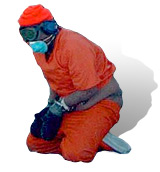 The U.S. House Foreign Affairs Subcommittee on Human Rights held a hearing on extraordinary rendition and other delights of the War on Terror on Tuesday, June 10th. After making their way through the finer points of extralegal prisoner transfers and the torture methods employed by the U.S. and our allies, the conversation turned to the Uyghurs marooned at Guantanamo Bay.
The U.S. House Foreign Affairs Subcommittee on Human Rights held a hearing on extraordinary rendition and other delights of the War on Terror on Tuesday, June 10th. After making their way through the finer points of extralegal prisoner transfers and the torture methods employed by the U.S. and our allies, the conversation turned to the Uyghurs marooned at Guantanamo Bay.
John Bellinger — previously a legal adviser to the National Security Council and currently shoveling shit over at the State Department — served as the Bush administration witness du jour.
A transcript of the hearing indicates that there is at least some congressional support for allowing the Uyghurs in limbo to start new lives in the United States:
BELLINGER: You mentioned the case of the Uighurs, I think, Mr. Rohrabacher. But that's where diplomatic assurances come in, because if we don't have a good alternative, if the alternative is to let the person go into the United States, I think you will be hearing from your constituents as to why are we letting someone go, who poses a risk to our country.
ROHRABACHER: Well, the question with the Uighurs, of course, was that the chairman and I have actually come to the conclusion — and I've looked at it — they were not a threat to the United States. In fact, perhaps their original incarceration was an error in judgment.
And when we have an error in judgment, again, we should admit it, and in this case not send them back to communist China, because of communist China's human rights record, and instead by admitting our mistake, permit them to stay here. The chairman and I in fact are signing a letter to that accord to the State Department.
The representatives also brought up the recently released information on Uyghur detainees being prepared for interrogation by the Chinese at Gitmo:
PITTS: Just to follow up on this Uighur situation, the Department of Justice inspector general report had a very interesting relevant footnote 134, where the IG revealed that an FBI agent told the IG that the Chinese government officials came to Guantanamo and interrogated the Uighurs being detained there by the U.S. military.
And he reported that at the request of the Chinese government interrogators, these people, the Uighur detainees, were subjected first to forced sleeplessness, and then low temperature room for night and day, before questioning by the Chinese officials.
The key point here is that U.S. government officials invited the very Chinese government that mistreated the Uighurs, caused them to flee China, and they were allowed by the U.S. to interrogate them at a highly restricted U.S. military base, where ironically members of Congress are not even allowed to talk to the detainees.
And allegedly, the U.S. military personnel were directed to soften them up, abuse them, whatever you want to call it, before getting them ready for questioning by the Chinese officials.
Who made the decision to allow the Chinese government to interrogate a persecuted religious minority in a U.S. military base? Who would make that decision?
BELLINGER: Sir, I would assume that would be the Department of Defense, and you would have to put the question to them. I will say, trying to connect this with the chairman's question, that we are concerned about the situation of the Uighurs.
We made the decision early on that because we thought they would be mistreated if returned to China, that even though a number of years back we had concluded not that they were wrongly picked up — they were picked up because they were in a training camp in Afghanistan — but it was concluded rapidly that they were not trying to fight us, but they were trying to fight the Chinese.
So we made the decision early on that they needed to be sent somewhere, but they just couldn't be sent back to China. But as far as that decision in Guantanamo, sir, you would have to ask the Defense Department.
DELAHUNT: Would the gentleman yield for a moment?
PITTS: Yes, Mr. Chairman.
DELAHUNT: I think — and we will obviously invite the Department of Defense to come before us and explain why the communist Chinese security agents were allowed to interrogate the Uighurs — that's a question that must be posed, and I think my friend from California concurs with me on that.
ROHRABACHER: If the gentleman — Mr. Pitts — would...
PITTS: Yes.
ROHRABACHER: I do concur, and I would associate myself with the outrage of Mr. Pitts and my chairman. And the fact is that this stems from a fundamentally flawed China policy itself, that this administration treats one of the world's most vicious dictatorships as if it is a country like Belgium or a democratic country.
And what we are seeing is flowing from that fundamental error on the part of the administration, or amoral policy of the administration, so I associate myself with — I'm more outraged than both of my colleagues on this.
And thus settling the question of who was most outraged, the meeting was adjourned. I'd like to post the full transcript below, but it's more than 20,000 words. If anyone really wants to read it, let me know.
If you need to catch up, read the first part of this ongoing series. Department of Defense bozos, you're on notice... stay tuned for Softening 'Em Up III!
posted June 12, 2008 at 12:10 AM unofficial Xinjiang time | Comments (56)
June 09, 2008
Xinjiang, 1941.
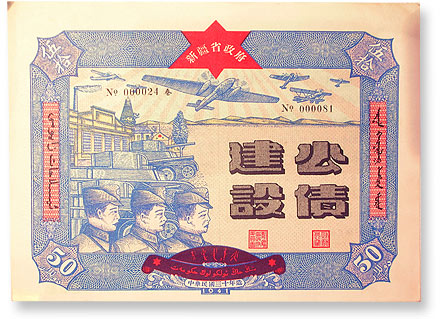
I was checking out Frog in a Well's interesting collection of 20th century Chinese currency, when I suddenly remembered taking the picture you see above two years ago in the Xinjiang Museum.
I'm not exactly sure if you can call it a bank note (it says something about being a "construction bond"), but the imagery is fantastic and it comes from an interesting period in Xinjiang history.
The text along the bottom reads "printed in the 30th year of the Republic of China" above the date, 1941... during the decade between the briefly independent First and Second East Turkestan Republics, when Sheng Shicai ruled with an iron fist and Moscow more or less called the shots in Xinjiang. Chairman Mao's little brother, Mao Zemin, was living in Urumqi at the time and became the proud father of a baby boy that year, named Mao Yuanxin. (Mao Zemin and his pregnant wife were arrested by Sheng Shicai and the baby was born in prison. Mao Zemin was executed in Urumqi two years later, and the baby grew up to become a central figure in the Cultural Revolution and an ally of the Gang of Four.)
And check out the engraved imagery. How much more could they pack in there? You've got poorly rendered quasi-Nationalist soldiers, Soviet tanks, a smoke-belching factory, the Emin Minaret in Turpan, several monoplanes, a biplane, and the shifting sands of the Taklamakan Desert. That's not to mention text in Uyghur, Chinese, and Mongolian.
Click on the image above for a closer look.
posted June 09, 2008 at 10:25 PM unofficial Xinjiang time | Comments (64)
June 07, 2008
Uyghurs Attack Police Station
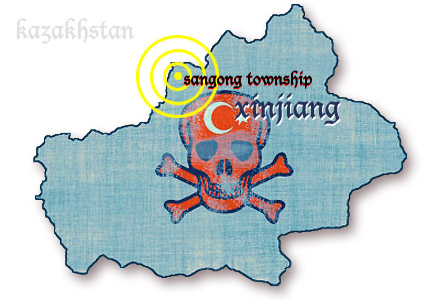
Late news tonight from AFP of an attack on a police station last week in Sangong, Xinjiang. The town appears to be right near China's border with Kazakhstan:
Ethnic Uighur Muslims in western China have attacked a police station with rocks and petrol bombs to protest a pre-Olympic crackdown, an exiled group said Friday.
The petrol bomb attack occurred last week in Sangong township in China's western-most Xinjiang region, Dilxat Raxit, spokesman of the German-based World Uighur Congress, told AFP.
Local police confirmed the attack when asked by AFP, but refused to comment further on the case.
Raxit said it was prompted by a police crackdown aimed at heading off unrest among the Uighurs, the largest ethnic group in Xinjiang region, ahead of the Beijing Olympics in August.
No further details at the moment, but I'll check again in the morning and update this post if anything new comes out. The AFP article is posted below.
Uighurs attack west China police station: police
6 June 2008
Agence France Presse
Ethnic Uighur Muslims in western China have attacked a police station with rocks and petrol bombs to protest a pre-Olympic crackdown, an exiled group said Friday.
The petrol bomb attack occurred last week in Sangong township in China's western-most Xinjiang region, Dilxat Raxit, spokesman of the German-based World Uighur Congress, told AFP.
Local police confirmed the attack when asked by AFP, but refused to comment further on the case.
Raxit said it was prompted by a police crackdown aimed at heading off unrest among the Uighurs, the largest ethnic group in Xinjiang region, ahead of the Beijing Olympics in August.
"The Chinese authorities are using the opportunity of the Olympic Games to oppress the Uighur population," Raxit said.
"They are arresting people without any legal procedure... anyone they suspect of being opposed to the Chinese government is being rounded up."
Xinjiang is home to over 8.3 million Uighurs, a Muslim central Asian people who have long chafed under Beijing's control.
Many accuse China of harsh oppression and policies that they say are aimed at extinguishing their culture.
Raxit said the attack occurred after peaceful attempts to end the ongoing police crackdown proved ineffective.
Following last week's attack, the police crackdown has intensified, with "several dozens" of young Uighurs suspected of taking part being taken into police custody, he added.
posted June 07, 2008 at 12:14 AM unofficial Xinjiang time | Comments (59)
June 04, 2008
Don't Forget Gansu
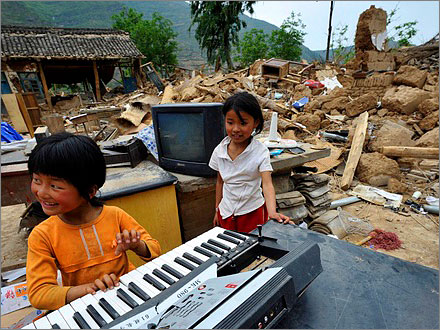
Up in the title bar I claim to focus on northwest China, though that almost always means writing about Xinjiang, and occasionally Tibet. Today, though, I'd like to turn your attention to Gansu for a moment.
When the earthquake struck on May 12, Sichuan was absolutely devastated, but southern Gansu was also hit hard. 364 people were killed and thousands of buildings were damaged or destroyed. The scale of the disaster pales in comparison to what happened in Mianyang, Mianzhu, Aba, etc... but there are plenty of other people out there blogging about Sichuan.
An article in yesterday's South China Morning Post publicized Gansu earthquake victims' complaints that the aid they're receiving is inadequate and slow to arrive:
Zhang Quanshou, party secretary of Ranjia village, reachable only by a treacherous switchback mountain road, said they desperately needed more tents. All 72 houses in the village had collapsed.
"We know the governments are not deserting us, but we do need more help," a tearful Mr Zhang said.
Huang Huawen, party secretary of Yulei township, whose 5,670 villagers lost much of their farmland to two reservoirs, said township authorities had been overwhelmed in the first days after disaster struck, because they were left to themselves to cope. The township had received 800 tents but would need another 1,000, he said.
Many in Wen county have been dismayed by the scant support. Some blame a gagging order by the province's publicity department on media coverage of the quake's impact on Gansu.
"It's ridiculous to watch Gansu reporters in Sichuan covering the quake while the hardship at their doorsteps is ignored," Mr Huang said.
Everyone appreciates the enormous difficulty of conducting relief operations on the scale of what we're seeing now in Sichuan, but it's important to make sure that no one gets left out... after all, an earthquake victim is a victim no matter if they live in Sichuan, Gansu, Shaanxi, Chongqing, Henan, Guizhou, Hubei, Hunan, or Yunnan (all of which suffered at least one quake-related death, according to Wikipedia).
SCMP also reported last week that the more than 100 pandas in Gansu's Baishuijiang National Nature Reserve have vanished without a trace:
Not a single panda has been seen by inspectors at the Baishuijiang National Nature Reserve in Gansu's Wen county, the world's biggest panda reserve, according to reserve director Li Shiren.
Mr. Li said the animals were easy to find before the May 12 quake....
Mr Li said the quake triggered many landslides in the reserve, and most of the roads built last year to monitor the animals were damaged.
Adventures in Gansu have given me a number of priceless memories over these past few years in China, so I figure I owe the province a bit of attention every once in a while. The areas of Gansu along the border with Sichuan are incredibly remote, and I hope you'll keep the people (and pandas) there affected by the earthquake in your thoughts.
Go, go, Gansu! 甘肃加油! You can read the full articles from SCMP below.
Gansu quake victims left to go it alone
Raymond Li in Wen county
3 June 2008
South China Morning Post
The villagers were agitated. The May 12 earthquake flattened nearly all their timber-and-clay homes or left them too dangerous to live in, yet they are struggling for shelter and the summer harvest is looming.
They had still received only "1 metre" of plastic sheeting per person, "but we need at least 6 metres to make one tent", said Jiuzhai villager Chen Shuqin .
Deputy township chief Cao Bin said: "We were told to arrange our own vehicles to ferry in relief supplies."
The people of Jiuzhai and tens of thousands like them in Wen county, one of the poorest areas of Gansu province , itself among the nation's poorest, have largely been left to fend for themselves in the three weeks since the magnitude 8 quake killed 365 of their neighbours and injured 10,157.
The survivors are still waiting for the sort of relief poured into Sichuan , the worst-affected province where more than 68,000 are known to have died.
Only a few local vehicles carrying relief supplies ply the roads.
In Jiuzhai, Mrs Chen, a mother in her early 30s, said: "We have to share one makeshift tent with several neighbours."
Mr Cao is in charge of distributing relief materials to 2,526 households in Tielou township. He said only about 500 tents had arrived and most had been given to families living higher up in the mountains, where almost all the homes collapsed.
Zhang Quanshou , party secretary of Ranjia village, reachable only by a treacherous switchback mountain road, said they desperately needed more tents. All 72 houses in the village had collapsed.
"We know the governments are not deserting us, but we do need more help," a tearful Mr Zhang said.
Huang Huawen , party secretary of Yulei township, whose 5,670 villagers lost much of their farmland to two reservoirs, said township authorities had been overwhelmed in the first days after disaster struck, because they were left to themselves to cope. The township had received 800 tents but would need another 1,000, he said.
Many in Wen county have been dismayed by the scant support. Some blame a gagging order by the province's publicity department on media coverage of the quake's impact on Gansu.
"It's ridiculous to watch Gansu reporters in Sichuan covering the quake while the hardship at their doorsteps is ignored," Mr Huang said.
Gansu Governor Xu Shousheng , who accompanied President Hu Jintao on visits to quake-hit parts of the province at the weekend, said it needed to build 80,000 temporary homes and reconstruction would take at least three years.
Uncertainty over fate of 100 pandas at Gansu reserve
Zhuang Pinghui
May 30, 2008
South China Morning Post
The fate of more than 100 giant pandas at a nature reserve in Gansu remained unclear yesterday, two weeks after the quake struck neighbouring Sichuan.
Not a single panda has been seen by inspectors at the Baishuijiang National Nature Reserve in Gansu's Wen county, the world's biggest panda reserve, according to reserve director Li Shiren.
Mr Li said the animals were easy to find before the May 12 quake.
The county is about 200km from the epicentre, and suffered 111 deaths and more than 1,000 injuries during the massive tremor.
The reserve is one of three nationally designated zones set aside for panda protection and was home to 102 pandas in 2003.
Mr Li said the quake triggered many landslides in the reserve, and most of the roads built last year to monitor the animals were damaged.
Xinhua yesterday quoted the reserve's director, Huang Huali, as saying the condition of the pandas was unclear and the staff could not risk the danger of frequent aftershocks to check on them.
The quake has changed the pandas' habitat and inflicted heavy damage on their main food, bamboo.
The catastrophe may also affect breeding this year because May is the peak mating season, Mr Huang said.
He said the reserve would send staff to rescue the pandas as soon as conditions permitted.
A team of 16 scientists studying the pandas when the quake struck reported that they heard animals panicking as rocks and trees fell during the disaster, Xinhua reported. But Mr Li said the pandas should be safe. He said the inspectors had checked the worst-hit areas and found no signs of injured pandas.
Contrary to a report in the Lanzhou Morning Post yesterday saying inspectors fled the reserve immediately after the quake, Mr Li said staff did not leave until May 18, and seven field stations for the pandas had been operating since the quake.
He said most of the bamboo was fine and should be able to sustain the pandas. But he admitted that the damaged roads meant it would take longer for inspectors to reach the animals' usual stamping grounds.
The inspectors did not reach deep into the reserve as it would take four or five days and be very dangerous because of the frequent aftershocks, he said.
The 223,000-hectare reserve was set up in 1978. It has 10 species under first-class protection, including giant pandas and golden monkeys. It is also home to 42 animals with second-class protection, and six plants under top protection, the report said.
China has more than 1,590 pandas, according to a 2003 survey, and 76 per cent of them are in Sichuan. The Wolong Giant Panda Protection and Research Centre, which is just 30km from the May 12 quake's epicentre, is home to 63 pandas. All but one was safe and accounted for.
posted June 04, 2008 at 07:26 PM unofficial Xinjiang time | Comments (47)
